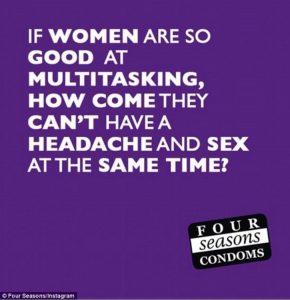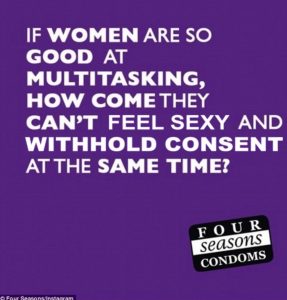

(Original) (Altered Adervtisment)
What sells more, for her pleasure or his? According to most condom advertisements, sex sells. However, from my research, it appears that sexism is really doing the selling. Women are the main feature of the majority of condom advertisements, but these women are not being displayed in an equal partnership with the men the advertisers are targeting. The targeted group, being young men, presents an increase in the amount of vulgar material present in the advertisement. These ads, like the one above, create an environment where sexism becomes a joke. A gimmick to sell a product. Companies are making men feel more “powerful” and creating an idea that women should always be available for sex. This is not a new concept and it can be seen with so many products related to sex, pornography, sexual practices, and general societal beliefs around sex. This condom advertisement was created by Four Seasons Condoms, an Australia based company. They have had many of their advertisements banned from media because of the vulgarity and level of offensiveness present in their advertising. The one pictured above is no exception. The advertisement takes on a presumably man’s perspective about the reason his partner does not want to have sex. It engages a common idea that women have to think of an excuse to turn their partners down for sex. The example of a headache is heard in this context frequently. This advertisement speaks down to women and dismisses the concept of an enthusiastic yes when it comes to consent. Men becoming aggressive or agitated when their sexual advances are rejected is another theme being amplified here. The advertisement is working to make a joke of consent. It is also enforcing the bad stereotypes surrounding female sexual activity and libido. My attempt to alter the image is focused on the harm the narrative provokes about consent and female sexual drive.
My alteration hopefully sparked a conversation about consent. The crass and inappropriate joke around a women’s choice to consent to sex, regardless if with a long-term partner or not, should never be a laughing matter. The jamming of this advertisement’s slogan attempts to play into the stereotype around excuses to get out of sex with your partner while creating a powerful statement that puts the power into the woman’s hands. Ads around sex so often make the male partners dominate, in charge and even borderline abusive. There are very few ads that make fun of the male performance and highlight their inability in the bedroom. The consumers are primarily men and the way to target this group is disturbing, to say the least. The ridiculousness of the sexism in this ad is hopefully diminished with the new phrase. Women can feel good about themselves and their bodies while still saying no to sex. Their level of self-worth is not based on how their partner’s opinions. The woman depicted in the new slogan feels modern, empowered and safe. While in comparison the old slogan shows a woman being talked down too by her partner while faking illness to get out of being intimate with a said partner. The condom company responsible for this jarring slogan has begun to take a step back from the vulgar, sexist content and replaced it with shockingly graphic sexual innuendos. In these new advertisements, the power is more evenly distributed between both parties, but still tasteless at its core. There is a big difference between celebrating sexuality and using the objectification of women to sell a product.